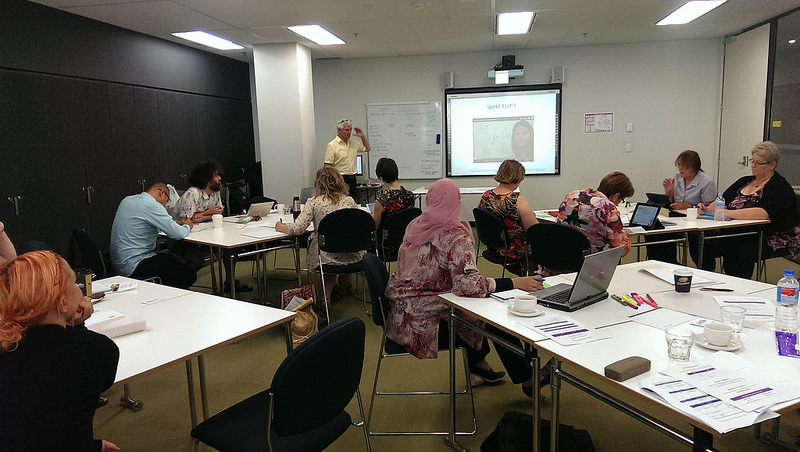Thesis Statement
What is the pedagogy of narrative fluency, and where does it fall short?
The aim of liberal-arts classes like foreign languages, history, and social studies is to teach students how to handle information. Information is more than just data and facts, grammar and vocab. Postmodernism tells us that information is never far from narrative—good- and bad-faith narratives, fictional and nonfictional narratives, and downright fake narratives. Today, the ability to assess bias and generate compelling original arguments is no longer an abstract exercise, but an essential survival skill. Cases like Jun-ho’s, however, remind us that pedagogical ideals like media literacy, critical thinking, and intellectual responsibility are difficult to package in a lesson plan.

Discursive pedagogy: in the “flipped” classroom, students study new material at home and use class time for discussion and collaborative problem-solving.
Vanguard Visions via Flickr
Social-science educators, recognizing the importance of narrative skills, have abandoned traditional practices like memorization and translation in favor of discursive models suited to our postmodern environment. In K–12 education, media-literacy and critical-thinking activities aim to help students sort facts from opinions and detect bias (or malice) in media. In higher ed, meanwhile, the conversation centers around protecting the intellectual standing of academia and dissuading the public from phony news sites and bad science. While these initiatives’ immediate goals vary, all invest in what I call narrative fluency: the ability to dissemble narratives into claims of fact and assemble facts into compelling narratives.
The pedagogy of narrative fluency misses the mark in two crucial ways. First, it situates the machinery of disinformation outside the student's mind, as though objectivity can be reached if we only think hard enough. In fact, it's the pleasant delusion of objective witness that makes bad-faith narratives so infectious. Second, narrative fluency advertises itself as a moral tonic, but at best it is morally neutral, and in practice it backfires easily. Some students who absorb the lessons of narrative fluency will become woke journalists or grassroots politicians, but those who are savvy enough to measure the broken incentives of the modern economy will recognize that they can make a lot more money by turning their back on humanist ideals and manipulating their peers for pay.
It should therefore come as no surprise that elite schools promise that their students are the most narratively fluent of all. Narrative fluency, like similar pedagogical trends that went before it, is already helping the wealthy safeguard their influence from generational change.